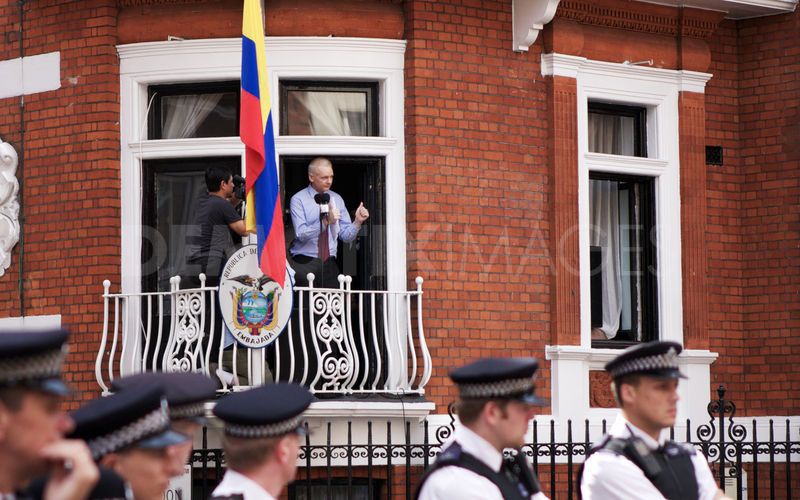
Image courtesy of Demotix
In providing a critical appraisal of the refuge being provided Julian Assange, I will first talk about who Julian Assange is and how he ended up in the Ecuadorian Embassy. After this, the paper will take a look at what the Vienna Convention on Diplomatic Relations 1961 is—specifically how Article 41(3) of the convention relates to the subject under discussion. In addition to this, the presentation will look at what some other legal scholars have to say about the subject under discussion.
Background
Who is Julian Assange?
Julian Assange is an Australian publisher, journalist, computer programmer, activist and whistleblower from Townsville, Queensland, Australia. In 2006, he and some friends founded Wikileaks where he worked as its editor-in-chief according to the Wikileaks website.
Wikileaks operated out of Sweden probably because of the country’s strict anonymity laws. Between 2006 and 2009, Mr. Assange and Wikileaks gained international notoriety for making public, very large amounts of previously confidential government and corporate information.
The most cited of the whistle blowing documents are the ones allegedly obtained from Chelsea Manning (formerly Bradley Edward Manning, a U.S. Army intelligence analyst). The documents included:
-
the Collateral Murder video (April 2010): This is the Baghdad airstrike video
-
the Afghanistan war logs (July 2010): This comprises 91,731 documents
-
the Iraq war logs (October 2010): This is made up of 391,832 classified military reports covering the period January 2004 to December 2009
-
over a quarter of a million diplomatic cables (November 2010)
-
the Guantánamo files (April 2011)
The U.S. understandable unhappy with the collateral damage caused by the leaks of the classified information opened investigations into Wikileaks and Julian Assange.
Why did Assange seek refuge at the Ecuadorian Embassy?
Right about the time the U.S. opened investigations into Julian Assange, the Swedish government received complaints from two women who alleged that Julian Assange had sexually abused them.
Mr. Assange was in the UK when and European Arrest Warrant (EAW) was issued for his arrest so he could come and answer questions. The warrant listed four alleged offenses namely:
-
one count of unlawful coercion
-
two counts of sexual molestation
-
one count of lesser-degree rape (European Arrest Warrant Ref No. Am-131226-10, 2010)
Julian Assange refused to submit himself to the Swedish authorities and a debate soon ensued in the UK where he was at the time of the serving of the warrant. The UK was initially unsure if such a warrant could be served in the UK. Eventually the UK Supreme Court “…found that European prosecutors could issue extradition warrants in the UK without any judicial oversight, even though Parliament intended otherwise” (Ambos, 2012). It had been agreed that Assange would be extradited to Sweden. The UK court granted Julian Assange bail on December 16, 2010.
Assange took advantage of this, went to the Ecuadorian Embassy in London to request “diplomatic protection of the Ecuadorian State, invoking the norms on political asylum in force (Statement of the Government of the Republic of Ecuador on the asylum request of Julian Assange , 2012). The Ecuadorian government granted this request citing among others Article 41 of the Constitution of the Republic of Ecuador which defines the right to grant asylum. The right to asylum is also enshrined in “Article 4.7 of the Organic Law of Foreign Service of 2006 of the Ministry of Foreign Affairs, Trade and Integration of Ecuador to know the cases of diplomatic asylum, according to the laws, the treaties, the rights and the international practice”.
Mr. Assange has been taking refuge in the Ecuadoran embassy for the past 2 years. At a cost to taxpayers of an estimated £6 million, the UK police have for this period been stationed around the embassy (Robinson, 2014).
The Vienna Convention on Diplomatic Relations 1961
The United Nations Conference on Diplomatic Intercourse and Immunities took place in Vienna from 2 March to 14 April 1961. Eighty-one delegates took part of which, seventy-five were United Nations members. The convention was signed on 18 April, 1961 and entered into force on 24 April 1964 in accordance with article 51 (Denza, 2009).
As of the time of this writing, the convention has sixty Signatories and one hundred and ninety Parties.
The Convention describes the framework for establishing, maintaining and terminating diplomatic relations on a basis of consent between independent sovereign States. Article 22 states the inviolability of mission premises – which in Julian Assange’s case bars “any right of entry by law enforcement officers of the receiving State and imposing on the receiving State a special duty to protect the premises against intrusion, damage, disturbance of the peace or infringement of dignity” (Denza, 2009).
Article 41(3)
Article 41(3) states that:
The premises of the mission must not be used in any manner incompatible with the functions of the mission as laid down in the present Convention or by other rules of general international law or by any special agreements in force between the sending and the receiving State.
The functions of diplomatic missions are captured in Article 3:
-
The functions of a diplomatic mission consist, inter alia, in:
-
Representing the sending State in the receiving State;
-
Protecting in the receiving State the interests of the sending State and of its nationals, within the limits permitted by international law;
-
Negotiating with the Government of the receiving State;
-
Ascertaining by all lawful means conditions and developments in the receiving State, and reporting thereon to the Government of the sending State;
-
Promoting friendly relations between the sending State and the receiving State, and developing their economic, cultural and scientific relations.
-
-
Nothing in the present Convention shall be construed as preventing the performance of consular functions by a diplomatic mission
Critical Appraisal
Diplomatic Protection
According to the Statement of the Government of the Republic of Ecuador on the asylum request of Julian Assange, “On June 19, 2012, the Australian citizen Julian Assange, showed up on the headquarters of the Ecuadorian Embassy in London, with the purpose of requesting diplomatic protection of the Ecuadorian State, invoking the norms on political asylum in force. The requester has based his petition on the fear of an eventual political persecution of which he may be a victim in a third State, which can use his extradition to the Swedish Kingdom to obtain in turn the ulterior extradition to such country”.
As per the 2006 Draft Articles on Diplomatic Protection adopted by the International Law Commission at its fifty-eighth session, diplomatic protection is defined by Article 1 as “the invocation by a State, through diplomatic action or other means of peaceful settlement, of the responsibility of another State for an injury caused by an internationally wrongful act of that State to a natural or legal person that is a national of the former State with a view to the implementation of such responsibility”.
Article 3 (1) states that, “The State entitled to exercise diplomatic protection is the State of nationality”. Article 4 clarifies what is meant by state of nationality: “For the purposes of the diplomatic protection of a natural person, a State of nationality means a State whose nationality that person has acquired, in accordance with the law of that State, by birth, descent, naturalization, succession of States or in any other manner, not inconsistent with international law.”
Mr. Assange did not qualify for any of the above.
Article 5 (3) adds that “Diplomatic protection shall not be exercised by the present State of nationality in respect of a person against a former State of nationality of that person for an injury caused when that person was a national of the former State of nationality and not of the present State of nationality”.
Diplomatic protection is this extended to nationals (Article 3), corporations (Article 9), stateless persons and refugees (Articles 8).
Below is Article 8:
-
A State may exercise diplomatic protection in respect of a stateless person who, at the date of injury and at the date of the official presentation of the claim, is lawfully and habitually resident in that State.
-
A State may exercise diplomatic protection in respect of a person who is recognized as a refugee by that State, in accordance with internationally accepted standards, when that person, at the date of injury and at the date of the official presentation of the claim, is lawfully and habitually resident in that State.
-
Paragraph 2 does not apply in respect of an injury caused by an internationally wrongful act of the State of nationality of the refugee.
Mr. Assange at the time of requesting for diplomatic protection was and is currently not a national, corporation, a stateless person but may be considered as a refugee. Refuge is not a concept of customary international law
The Convention relating to the Status of Refugees defines refugee as:
…any person who:
(1) Has been considered a refugee under the Arrangements of 12 May 1926 and 30 June 1928 or under the Conventions of 28 October 1933 and 10 February 1938, the Protocol of 14 September 1939 or the Constitution of the International Refugee Organization;
Decisions of non-eligibility taken by the International Refugee Organization during the period of its activities shall not prevent the status of refugee being accorded to persons who fulfil the conditions of paragraph 2 of this section;
(2) As a result of events occurring before 1 January 1951 and owing to well-founded fear of being persecuted for reasons of race, religion, nationality, membership of a particular social group or political opinion, is outside the country of his nationality and is unable or, owing to such fear, is unwilling to avail himself of the protection of that country; or who, not having a nationality and being outside the country of his former habitual residence as a result of such events, is unable or, owing to such fear, is unwilling to return to it.
Mr. Assange could qualify as a refugee not because Australia was no longer hospitable to him but because he fears being persecuted for reasons of membership of a particular social group i.e. Wikipedia and for his political opinions. The questions that beg to be answered though are:
-
Does this fear exonerate him from the criminal offences for which he has been alleged to commit?
-
Does he have any substantial proof that Sweden will hand him over to the United States?
-
To what extent can Ecuador infringe upon the judicial process of the receiving state while brazenly challenging its authority?
The same 1951 convention states in Article 1 (F)
The provisions of this Convention shall not apply to any person with respect to whom there are serious reasons for considering that:
(a) He has committed a crime against peace, a war crime, or a crime against humanity, as defined in the international instruments drawn up to make provision in respect of such crimes;
(b) He has committed a serious non-political crime outside the country of refuge prior to his admission to that country as a refugee;
(c) He has been guilty of acts contrary to the purposes and principles of the United Nations.
The (b) is a valid argument for this convention not applying to Julian Assange if one were to use the argument that he committed non-political crime(s) i.e. the offenses stated in the European arrest warrant that Brittan was hindered by Ecuador form effecting.
Asylum
The word “asylum” is said to be derived from the Latin equivalent of the Greek word “asylon,” which means freedom from seizure (Boed, 1994). Writing on “Asylum in International Law”, in the Encyclopedia Britannica, Professor George J. Andreopoulos differentiates 3 types of asylum:
Territorial asylum is granted within the territorial bounds of the state offering asylum and is an exception to the practice of extradition…
Extraterritorial asylum refers to asylum granted in embassies, legations, consulates, warships, and merchant vessels in foreign territory and is thus granted within the territory of the state from which protection is sought. Cases of extraterritorial asylum granted in embassies, legations, or consulates (generally known as diplomatic asylum) are often occasions for dispute. For example, after an unsuccessful uprising against the communist government of Hungary in 1956, the United States controversially granted diplomatic asylum to dissident Hungarian Roman Catholic József Cardinal Mindszenty, who was given refuge in the U.S. embassy and remained there for 15 years.
Neutral asylum is employed by states exercising neutrality during a war to offer asylum within its territory to troops of belligerent states, provided that the troops submit to internment for the duration of the war (Andreopoulos, 2014).
What has been granted Assage is thus Extraterritorial asylum.
The right to asylum has further been subdivided by Reed (1994) into 3:
-
the right of a state to grant asylum: This is taken from the principle that every sovereign state is deemed to ,have exclusive control over its territory and hence over persons present in its territory
-
the right of an individual to seek asylum: This comes from the principle that “a State may not claim to ‘own’ its nationals or residents.”
-
the right of an individual to be granted asylum: There is no general acceptance of this ‘right’ under international law
The Universal Declaration of Human Rights (UNDHR) in Article 14 states that:
-
Everyone has the right to seek and to enjoy in other countries asylum from persecution.
-
This right may not be invoked in the case of prosecutions genuinely arising from non-political crimes or from acts contrary to the purposes and principles of the United Nations.
Diplomatic asylum can be said to be founded on this article.
The United Nations 1951 Convention Relating to the Status of Refugees and the 1967 Protocol Relating to the Status of Refugees regulates national legislation with respect to political asylum because these form the primary instruments for the protection of people seeking asylum and refugees.
The 1951 Convention provides a way for determining who qualifies for the legal status of refugees, and also stipulates that they are not returned to the countries they run away from where their lives might be in danger (refoule).
The International Covenant on Civil and Political Rights of 1966 (ICCPR) is a treaty and provides in Article 26 that:
All persons are equal before the law and are entitled without any discrimination to the equal protection of the law. In this respect, the law shall prohibit any discrimination and guarantee to all persons equal and effective protection against discrimination on any ground such as race, colour, sex, language, religion, political or other opinion, national or social origin, property, birth or other status.
Article 2 of the 1969 OAU Refugee Convention Governing the Specific Aspects of Refugee Problems in Africa which entered into force on June 20, 1974 also states:
Asylum
-
Member States of the OAU shall use their best endeavours consistent with their respective legislations to receive refugees and to secure the settlement of those refugees who, for well-founded reasons, are unable or unwilling to return to their country of origin or nationality.
-
The grant of asylum to refugees is a peaceful and humanitarian act and shall not be regarded as an unfriendly act by any Member State.
-
No person shall be subjected by a Member State to measures such as rejection at the frontier, return or expulsion, which would compel him to return to or remain in a territory where his life, physical integrity or liberty would be threatened for the reasons set out in Article I, paragraphs 1 and 2.
-
Where a Member State finds difficulty in continuing to grant asylum to refugees, such Member State may appeal directly to other Member States and through the OAU, and such other Member States shall in the spirit of African solidarity and international cooperation take appropriate measures to lighten the burden of the Member State granting asylum.
-
Where a refugee has not received the right to reside in any country of asylum, he may be granted temporary residence in any country of asylum in which he first presented himself as a refugee pending arrangement for his resettlement in accordance with the preceding paragraph.
-
For reasons of security, countries of asylum shall, as far as possible, settle refugees at a reasonable distance from the frontier of their country of origin.
While the UNDHR makes room or can be stretched to include Extraterritorial asylum, it would seem the others cannot. They rather make clear a case for territorial asylum.
Historical Antecedents: The Case of József Mindszenty & Manuel Noriega
The Cardinal was critical of the pro-Nazi authorities under which he had served 8 years in prison even though he was the Prince Primate, and cardinal, and leader of the Catholic Church in Hungary. He was also critical of communism and so when the Soviet Union took power, he sought asylum from the U.S. Embassy in Budapest. It was granted and he ended up living there for 15 years.
In 1989, President Manuel Noriega was wanted by the US on several charges. He sought refuge in the Apostolic Nunciature of the Holy See which was granted by the Papal Nuncio in Panama.
In both cases, the church premises and embassy remained inviolable and the exit of the refuge seekers was only as a result on agreements arrived at by the different actors involved.
Diplomatic Asylum
The 22 September 1975, UN General Assembly, Question of Diplomatic Asylum: Report of the Secretary-General defines diplomatic asylum as follows:
The term “diplomatic asylum” in the broad sense is used to denote asylum granted by a State outside its territory, particularly in its diplomatic missions (diplomatic asylum in the strict sense), in its consulates, on board its ships in the territorial waters of another State (naval asylum), and also on board its aircraft and of its military or para-military installations in foreign territory. The other form of asylum granted to individuals, namely, that which is granted by the State within its borders, is generally given the name “territorial asylum” (UN General Assembly, 1975).
This report shows clearly how divided world leaders were almost 20 years after the 1951 convention on diplomatic asylum.
Elements of diplomatic asylum as granted to Assange can be summed up in the following according to Simona Leonavičiūtė:
-
It is internal asylum;
-
granted in diplomatic missions or consulates;
-
in the territory of the receiving State;
-
by the head of mission of the Sending State;
-
for fugitives from the Receiving State;
-
who are being sought mainly for political reasons
Again, Assange was not being sought by the UK or Sweden for political reasons. As of today, no charges as yet have been brought against him—only the offenses stated in the European Arrest warrant.
The term ‘diplomatic asylum’ has come under disputation by some scholars with regards to this particular case.
Curiously, the Vienna Convention on Diplomatic Relations does not expressly make mention of diplomatic asylum.
In the republic of Ecuador’s government’s detailed statement as to why they granted Assange refuge, the statement reads, “[F]aithful to its tradition to protect those who seek shelter in its territory or in the premises of its diplomatic missions, [The Government of Ecuaddor] has decided to grant diplomatic asylum to the citizen Julian Assange” (Statement of the Government of the Republic of Ecuador on the asylum request of Julian Assange , 2012).
A Professor of Public International Law at the University of Luxembourg and an associate tenant at 3 Hare Court, London, Matthew Happold has argued that the general use of the term “diplomatic asylum” in this peculiar case is flawed.
Recalling the Colombia v Perú [1950] ICJ 6 (also known as the Asylum Case) brought before the International Court of Justice, the leader of the Peruvian APRA movement sought protection in a Colombian Embassy in Lima. In this matter the International Court of Justice ruling` stated:
In the case of diplomatic asylum, the refugee is within the territory of the State where the offence was committed. A decision to grant diplomatic asylum involves derogation from the sovereignty of that State. It withdraws the offender from the jurisdiction of the territorial State and constitutes an intervention in matters which are exclusively within the competence of that State. Such a derogation from territorial sovereignty cannot be recognized unless its legal basis is established in each particular case.
The opinion suggests that where there is no treaty or customary rules to the contrary, if Ecuador for instance grants diplomatic asylum to Assange, this constitutes a derogation of the sovereignty of the receiving state i.e. the UK.
Here’s the court’s opinion citing a previous judgment:
…in principle, asylum cannot be opposed to the operation of justice. The safety which arises out of asylum cannot be construed as a protection against the regular application of the laws and against the jurisdiction of legally constituted tribunals. Protection thus understood would authorize the diplomatic agent to obstruct the application of the laws of the country, whereas it is his duty to respect them (HAYA DE LA TORRE CASE: Colombia v. Peru, 1951)
From the above judgment as well as on the basis of Article 41(3) of the Vienna Convention on Diplomatic Relations (1961), it is amply clear that a diplomatic mission is not supposed to generally concern itself with obstructing the operation of justice. Furthermore the Vienna Convention on Diplomatic Relations, demands that Ecuador’s government and mission respect the UK’s laws and regulations—not interfere with them—especially when it concerns the regular application of the laws and against the jurisdiction of legally constituted tribunals”—in this case the UK Supreme Court.
It is true that the offense was not committed in the UK. But it is also true that the UK was mandated to effect that warrant but were prohibited in doing so by the granting of diplomatic asylum.
Ambos (2012) differentiated between conventional asylum and diplomatic asylum. The latter according to him is misconceivved by the Ecuadorian Government. He argues that “despite repeated occurrence of such escapes to embassies – [it] is not acknowledged in international law”. And because it is not acknowledged in genera international law, “States are not required to grant safe passage out of their territory to those who seek asylum in diplomatic premises within their territory (unless there is a specific treaty which provides for such an obligation, which there is not in this case)” (Akande, 2012).
Ambo (2012) cites the ICJ in the aforementioned case of the Peruvian political figure Raúl Haya de la Torre making mention that, the ICJ “held that such kind of asylum can only be recognized if founded on explicit legal terms…This results from the fact that granting diplomatic asylum constitutes interference in the territorial state’s internal affairs” thus agreeing with the position held by Happold (2012).
Ambos (2012) adds, “For the sending state granting asylum would, as a consequence, deprive the receiving state jurisdiction over the fugitive. This essentially distinguishes diplomatic asylum from conventional asylum that is granted by a state to persons situated on its own territory” (Ambos, 2012).
Arguments against Ecuadorian Asylum to Assange
Article 41 of the Vienna Convention on Diplomatic Relations (1961) states:
-
Without prejudice to their privileges and immunities, it is the DUTY of all persons enjoying such privileges and immunities to respect the laws and regulations of the receiving State. They also have a duty not to interfere in the internal affairs of that State.
-
The premises of the mission must not be used in any manner incompatible with the functions of the mission as laid down in the present Convention or by other rules of general international law or by any special agreements in force between the sending and the receiving State.
Article 3 (3) states that:
(e) Promoting friendly relations between the sending State and the receiving State, and developing their economic, cultural and scientific relations.
On the question, DOES INTERNATIONAL LAW PROHIBIT DIPLOMATIC ASYLUM?, Paul Behrens, in the Michigan Journal of International Law cites Article 41 (1) and and makes the following contribution:
While no article of the VCDR deals specifically with diplomatic asylum, the Convention does contain two norms in particular that have a direct and prima facie limiting effect on this practice. The first of them is the ban on interference itself; that norm is enshrined in the general provision on duties of diplomatic agents (Article 41(1) VCDR), which reads: “Without prejudice to their privileges and immunities, it is the duty of all persons enjoying such privileges and immunities to respect the laws and regulations of the receiving State. They also have a duty not to interfere in the internal affairs of that State.”
But the VCDR does not offer any clarification on the concept of interference, and it certainly does not dwell on the question of whether sheltering refugees on mission premises falls within its scope. The ICJ, too, has not been able to provide a detailed examination of this phenomenon. In the Asylum Case mentioned above, the court did not offer objective parameters for its rather general view that asylum is a form of “intervention.” All the same, the finding must count as one of the most explicit considerations of diplomatic interference by the ICJ (Behrens, 2014).
Diversion vis-à-vis facts and law
The Republic of Ecuador is in clear violation of Article 41(3) because it is clear that the Ecuadorian government is using its premises in a manner incompatible with the functions of the mission as laid down in the Convention. Nowhere in the functions of the mission is a mission granted GENERAL permission to harbor fugitives from the law of the receiving nation. Again nowhere in the functions is any mission granted a GENERAL permission to interrupt or interfere with legal proceedings within a receiving state. This is the case in Julian Assange’s saga. The Ecuadorian government interrupted with the administration of justice in both Sweden and the UK.
As has been noted by the Chair of Criminal Law, Criminal Procedure, Comparative Law and International Criminal Law at the Georg-August-Universität Göttingen in Germany who also works as a Judge at the Provincial Court (Landgericht) of Lower Saxony in Göttingen, “Julian Assange’s medal-worthy self-staging as a militant for worldwide freedom of opinion has diverted attention away from the fact that the dispute over his extradition has nothing to do with Wikileaks, but rather with the enforcement of a European arrest warrant from November 2010” (Ambos, 2012).
Much emphasis is placed by the media and the Assange camp on Wikileaks and Assange’s involvement in making public of classified information but the fact is that, the European Arrest Warrant issued against Mr. Assange has absolutely nothing to do with his Wikileaks activities—but everything to do with the allegations leveled against him by two women in Sweden.
It is noteworthy that in “… the detailed explanation given by the Ecuadorian Ministry of Foreign Affairs (on 16 August 2012) for the granting of diplomatic asylum no mention is made of the actual accusations against Assange (Ambos, 2012).
What then is the Ecuadorian position for granting a fugitive from the law diplomatic asylum based on? Pure conjecture and political expediency it seems but not the facts of the warrant! In the detailed statement of the Government of the Republic of Ecuador explaining why Julian Assange was granted diplomatic asylum, none of the allegations of committing sexual offences were taken into consideration.
Professor Kai Ambos explains that “According to the fundamental principle of mutual recognition as basis of the European arrest warrant, such a warrant is to be enforced by the executing member state (in this case Great Britain) without any further ado” (Ambos, 2012). This means the UK is responsible for enforcing the warrant against Mr. Assange but they are hindered in doing so because of the interference by Ecuador.
To therefore obstruct the operation of justice in Sweden and the UK without considering the substance of the Warrant because of which Mr. Assange is wanted for questioning in Sweden is a violation of the convention. Such diplomatic conduct is not part of the functions of the Ecuadorian mission as laid out in Article 3 of the Vienna Convention on Diplomatic Relations.
In spite of Ecuador clearly flouting Article 41(3), it’s not justification for the UK not to adhere to Article 22 of the same Convention which states that:
-
The premises of the mission shall be inviolable. The agents of the receiving State may not enter them, except with the consent of the head of the mission.
-
The receiving State is under a special duty to take all appropriate steps to protect the premises of the mission against any intrusion or damage and to prevent any disturbance of the peace of the mission or impairment of its dignity.
-
The premises of the mission, their furnishings and other property thereon and the means of transport of the mission shall be immune from search, requisition, attachment or execution.
As Professor Eileen Denza points out, to allow Ecuador to grant asylum to Assange in this case would be tantamount to “shooting a hole into the system of extradition”.
Professor of Public International Law at the University of Oxford, Dapo Akande has noted that, “It is fairly clear that Assange is not covered by Refugee Convention and is therefore not entitled to asylum as a matter of international law” (Akande, 2012).
PDF version with footnotes available here: CRITICAL APPRAISAL OF REFUGE PROVIDED JULIAN ASSANGE IN ECUADORIAN EMBASS1
Works Cited
Akande, D. (2012, August 17). The Julian Assange Affair: May the UK Terminate the Diplomatic Status of Ecuador’s Embassy? UPDATED. Retrieved November 20, 2014, from http://www.ejiltalk.org/may-the-uk-terminate-the-diplomatic-status-of-ecuadors-embassy/
Ambos, K. (2012, September 11). Diplomatic Asylum for Julian Assange? Retrieved Novenmber 19, 2014, from European Journal of Internaltional Law – ejiltalk: http://www.ejiltalk.org/diplomatic-asylum-for-julian-assange/
Andreopoulos, G. J. (2014). Asylum. Retrieved November 24, 2014, from Encyclopedia Britannica : http://www.britannica.com/EBchecked/topic/40220/asylum
Behrens, P. (2014). The Law of Diplomatic Asylum–a Contextual Approach (2014). Michigan Journal of International Law , 319-367.
Boed, R. (1994). The State of the Right of Asylum in International Law. Duke Journal of Comparative & International Law
, 5 (1), 1-34.
Denza, E. (2009). Vienna Convention on Diplomatic Relations. Retrieved November 19, 2014, from UN Legal Audio Visual library of International Law: http://legal.un.org/avl/pdf/ha/vcdr/vcdr_e.pdf
European Arrest Warrant Ref No. Am-131226-10. (2010, December 2). Retrieved November 19, 2014
Happold, M. (2012, June 24). Julian Assange and Diplomatic Asylum. Retrieved Novemmber 19, 2014, from European Journal of Internaltional Law – ejiltalk: http://www.ejiltalk.org/julian-assange-and-diplomatic-asylum/
HAYA DE LA TORRE CASE: Colombia v. Peru. (1951, June 13). 1950 ICJ REP. 266 (1950). Retrieved November 19, 2014, from INTERNATIONAL COURT OF JUSTICE: http://www.icj-cij.org/docket/files/14/1937.pdf
Robinson, M. (2014, April 25). Julian Assange has cost Britain £6m as policing bill to guard Ecuadorian embassy where WikiLeaks fugitive is hiding soars. Retrieved November 19, 2014, from The Daily Mail: http://www.dailymail.co.uk/news/article-2613102/Julian-Assange-costs-Britain-6m-policing-costs-bill-guard-Ecudorean-embassy-Wikileaks-fugitive-hiding-soars.html
Statement of the Government of the Republic of Ecuador on the asylum request of Julian Assange . (2012, June 9). NEWS RELEASE No. 042 . Retrieved Nov 19, 2014, from Ministerio de Relaciones Exteriores y Movilidad Humana: http://cancilleria.gob.ec/statement-of-the-government-of-the-republic-of-ecuador-on-the-asylum-request-of-julian-assange/?lang=en
UN General Assembly. (1975, September 22). Question of Diplomatic Asylum : Report of the Secretary-General. Retrieved November 24, 2014, from UNHCR: http://www.refworld.org/docid/3ae68bf10.html






